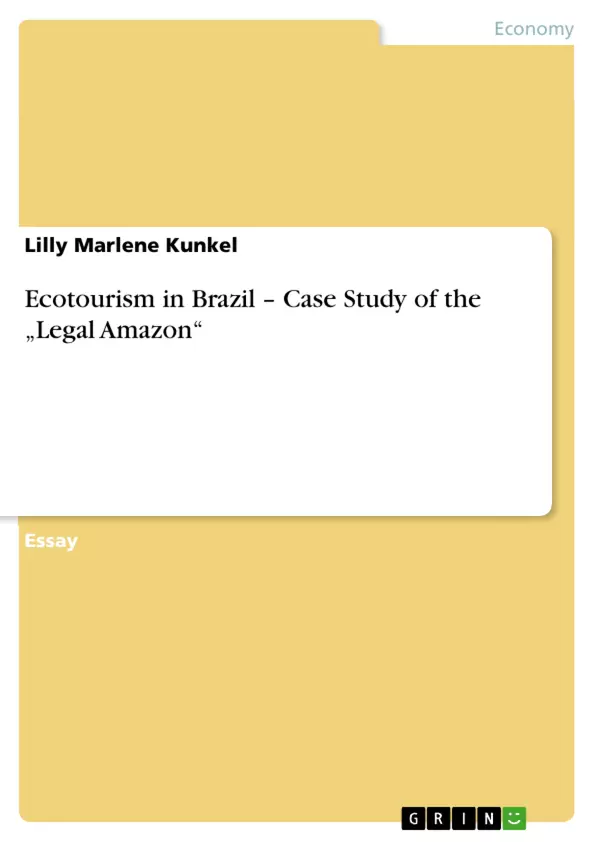The aim of this essay is to evaluate and critically discuss the ecotourism measures taken in Brazil. Due to the complexity of the topic and the size of the chosen country, the focus of this case study will lie on the national policy affecting ecotourism in Brazil, the involved stakeholders and their area of activity and some typical Brazilian examples of ecotourism planning/development projects in the Brazilian Amazon region.
Table of Contents
- 1. Introduction to Ecotourism
- 2. Defining Ecotourism
- 3. International Regulation and Certification of Ecotourism
Objectives and Key Themes
This essay critically evaluates ecotourism measures in Brazil, focusing on national policy, stakeholders, and specific projects in the Amazon region. It aims to analyze the application of sustainable tourism principles within a specific national context.
- Defining and differentiating ecotourism from nature tourism.
- The evolution of ecotourism definitions and the challenges of "greenwashing."
- International ecotourism regulation and certification processes.
- The application of sustainable tourism techniques.
- Case study of ecotourism in the Brazilian Amazon.
Chapter Summaries
1. Introduction to Ecotourism: This chapter introduces the concept of ecotourism, tracing its origins back to the 1960s with early definitions emphasizing minimal environmental and cultural impact, maximum economic benefits for locals, and high tourist satisfaction. It highlights the distinction between ecotourism and nature tourism, emphasizing ecotourism's focus on sustainability, education, and active tourist participation in supporting sustainable development. The chapter also notes the rapid growth of ecotourism and the ongoing debate surrounding its definition due to varying stakeholder interests and regional contexts, leading to issues of "greenwashing."
2. Defining Ecotourism: This chapter delves deeper into the complexities of defining ecotourism. It presents Fennell's content analysis of 85 ecotourism definitions, revealing key recurring variables such as location in natural areas, conservation, cultural considerations, local benefits, and education. The chapter emphasizes the evolving emphasis on conservation, education, ethics, sustainability, impacts, and local benefits in more recent definitions. It culminates in Fennell's own comprehensive definition of ecotourism as an intrinsic, participatory, and learning-based experience focused on natural history and the human-land relationship, aiming to develop sustainability through ethical behavior and tourism models that minimize environmental stress.
3. International Regulation and Certification of Ecotourism: This chapter examines the international efforts to regulate and standardize ecotourism. It discusses the role of organizations like the World Tourism Organization (WTO) and the impact of events such as the World Ecotourism Summit in Québec. The chapter highlights the rise of ecotourism certifications as tools for measuring sustainable tourism practices, emphasizing the importance of incorporating local criteria. It acknowledges the growing number of certifications worldwide, resulting in market complexity and reduced comparability. The chapter uses the Green Globe 21 standard as a prominent example of a global tourism certification program, detailing its key principles to illustrate best-practice approaches in ecotourism.
Keywords
Ecotourism, sustainable tourism, nature tourism, Green Globe 21, certification, Brazil, Amazon, conservation, sustainable development, local communities, cultural sensitivity, environmental impact.
Frequently Asked Questions: A Comprehensive Language Preview of Ecotourism
What is the purpose of this document?
This document provides a comprehensive preview of a text on ecotourism. It includes the table of contents, objectives and key themes, chapter summaries, and keywords, offering a structured overview of the subject matter.
What topics are covered in the Table of Contents?
The table of contents outlines three main chapters: 1. Introduction to Ecotourism; 2. Defining Ecotourism; and 3. International Regulation and Certification of Ecotourism.
What are the main objectives and key themes of the text?
The text critically evaluates ecotourism measures in Brazil, focusing on national policy, stakeholders, and specific projects in the Amazon region. Key themes include defining and differentiating ecotourism from nature tourism; the challenges of "greenwashing"; international ecotourism regulation and certification; the application of sustainable tourism techniques; and a case study of ecotourism in the Brazilian Amazon.
What are the key takeaways from Chapter 1: Introduction to Ecotourism?
Chapter 1 introduces the concept of ecotourism, tracing its origins and highlighting the distinction between ecotourism and nature tourism. It emphasizes sustainability, education, and active tourist participation. The chapter also addresses the ongoing debate surrounding its definition and the issue of "greenwashing."
What are the key takeaways from Chapter 2: Defining Ecotourism?
Chapter 2 delves into the complexities of defining ecotourism, presenting a content analysis of various definitions and emphasizing the evolving importance of conservation, education, ethics, sustainability, impacts, and local benefits. It culminates in a comprehensive definition of ecotourism focused on sustainability through ethical behavior and minimizing environmental stress.
What are the key takeaways from Chapter 3: International Regulation and Certification of Ecotourism?
Chapter 3 examines international efforts to regulate and standardize ecotourism, discussing the roles of organizations like the World Tourism Organization (WTO) and the importance of ecotourism certifications. It highlights the challenges of market complexity and reduced comparability among various certifications, using Green Globe 21 as a prominent example of a global tourism certification program.
What are the keywords associated with this text?
The keywords include: Ecotourism, sustainable tourism, nature tourism, Green Globe 21, certification, Brazil, Amazon, conservation, sustainable development, local communities, cultural sensitivity, and environmental impact.
What is the geographic focus of this text?
The text has a specific geographic focus on Brazil, particularly the Amazon region.
What is the overall approach of the text?
The text uses a critical and analytical approach, examining ecotourism practices within a specific national context and highlighting both successes and challenges.
- Quote paper
- Lilly Marlene Kunkel (Author), 2008, Ecotourism in Brazil – Case Study of the „Legal Amazon“, Munich, GRIN Verlag, https://www.grin.com/document/140511



